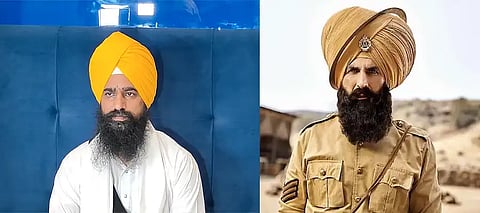

A special meeting was held at Sri Akal Takht on Friday amid growing concerns over films depicting Sikh history and religious figures. Punjab has witnessed back-to-back controversies, and demand for a ban on hurting religious sentiments has been raised. For instance, Gippy Grewal's movie Akaal received backlash, an AI-generated image of Aamir Khan playing Sri Guru Nanak Dev Ji in the upcoming movie had sparked a massive uproar among the Sikh community. As a result, a meeting was called at Sri Akal Takht Sahib, led by Acting Jathedar Singh Sahib Giani Kuldeep Singh Gargarj.
Jathedar Singh Sahib Giani Kuldeep Singh Gargarj addressed the media after the meeting, in which he strongly opposed Bollywood actor Akshay Kumar's latest announcement that he will make a film on Sikh warrior Hari Singh Nalwa in the movie Kesari Chapter 3. Jathedar Singh Sahib Giani Kuldeep Singh Gargarj opposed Akshay Kumar's announcement, citing concerns about commercial interests overshadowing historical and religious sensitivity.
Jathedar Gargarj reiterated that no permission was ever granted in 1934 to make films on Sikh Gurus, martyrs, or religious personalities. He emphasized that any film related to Sikh heritage must be approved by the Shiromani Gurdwara Parbandhak Committee (SGPC).
He further announced that a committee will soon be formed to draft guidelines regarding such representations. “Sikhism doesn’t need films for propagation — it needs character,” he asserted, stressing that Sikhs themselves shape the identity and narrative of their faith.
For the unversed, before the release of Kesari 2, Akshay Kumar gave a big update on Kesari Chapter 3. Akshay had said, "Now we have to prepare for Kesari 3 together. I was talking about this this morning. We are thinking of making it on Hari Singh Nalwa, what do you say? We will show the pride of Punjab to everyone."
Hari Singh Nalwa (1791-1837) held the position of Sikh commander-in-chief of the Sikh Khalsa Fauj under the reign of Maharaja Ranjit Singh. He governed Kashmir, Hazara, and Peshawar, earning recognition for his victories against Afghan forces. Nalwa had a crucial impact on stopping Afghan invasions into Punjab via the Khyber Pass. His contributions proved essential in the battles at Kasur, Sialkot, Attock, Multan, Kashmir, Peshawar, and Jamrud.
Historically, the Battle of Jamrud, which was a significant battle in the Afghan-Sikh Wars, was the last battle fought by Hari Singh Nalwa. He had led the advance against the Afghan army, resulting in a tragic loss of his life. But the Sikh Empire won the battle against the Afghans.